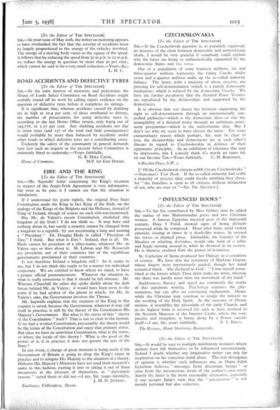EIRE AND THE KING
[To the Editor of THE SPECTATOR] SIR,—Mr. Saywells' letter concerning the King's situation in respect of the Anglo-Irish Agreement is very informative, but even as he puts it I cannot see that the situation is satisfactory.
If I understand his point rightly, the original Free State Constitution made the King in fact King of the Irish, on the analogy of the Kings of the Belgians and the Hellenes, instead of King of Ireland, though of course no such title was mentioned.
Has Mr. de Valera's recent Constitution abolished this kingdom of the Irish ? I do not think so. It may have said nothing about it, but surely a country cannot be changed from a kingdom to a republic by not mentioning a king and naming a " President." Dr. Douglas Hyde is called " President of Eire," I think. But what is Eire ? Ireland, that is all. Dr. Hyde cannot be president of a place-name, whatever Mr. de Valera says or does about it. M. Lebrun and Mr. Roosevelt are presidents not of their countries but of the republican governments proclaimed in their countries.
Is not therefore Ireland a kingdom still ? So it seems to me, but I do not think this ought to be a matter for individual conjecture. We are entitled to know where we stand, to have a proper official pronouncement. Whatever the situation is, what is really monstrous is that it should be left obscure. Mr. Winston Churchill the other day spoke darkly about the dark forces behind Mr. de Valera ; it would have been more to the point if he had spoken of the gloom in which, for Mr. de Valera's sake, the Government involves the Throne.
Mr. Saywells explains that the situation of the King in this Country is saved, because the Government, whatever it may call itself in practice, is still by the theory of the Constitution His Majesty's Government. But what is the status of this " theory of the Constitution " itself ? That is not so clear to the layman. If we had a written Constitution, presumably the theory would be the terms of the Constitution and enjoy that primary status. But since we have an unwritten Constitution, what is the status, or where the locale of this theory ? What is the good or the power of it, if in practice it does not govern the acts of the State ?
In any event, a change of great moment is being made if the Government of Britain is going to drop the King's name in practice and to relegate His Majesty to the situation of a theory. Hitherto His Majesty's Ministers have not used their monarch's name in this fashion, putting it into or taking it out of State documents at the pleasure of themselves, as " diplomatic reasons " suited them or did not.—I am, Sir, yours faithfully, J. M. N. JEFFRIES. Easthayes, Cullompton, Devon.


















































 Previous page
Previous page